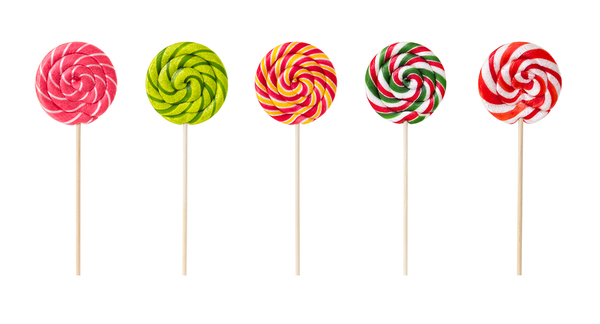


Sugar alcohols, surprisingly, are neither sugars nor alcohols. Chemically they look a bit like both sugar and alcohol, thus the name. Sugar alcohols, also known as polyols, are technically carbohydrates. These polyols occur naturally in some plants, but can be made synthetically, which is the form used by the food industry. They are used to replace sugars and have long been used in a number of foods. 
Sugar alcohols are sometimes used in low-calorie or low-carb candies.
How Are They Used by the Food Industry? Sugar alcohols are primarily used in low-calorie and low-carbohydrate products, including candies, pastries, chewing gum, toothpaste and low carb protein bars and other snacks. Each has a slightly different flavor, so experimentation is required to determine the best one, or the best combination of sugar alcohols. When you read a nutrition label, if only a single type of sugar alcohol is listed (Xylitol, say), then that is the only one in the product. If multiple sugar alcohols are used in a food product, you will see them labeled simply as “sugar alcohols.” Although sugar alcohols are regulated by the FDA, some sugar alcohols, can forgo this process if scientists have already recognized them as safe. You can find them on food labels included in the "total carbohydrates" count, but manufacturers aren't required to list them unless the product is so-called "sugar-free," according to the International Food Information Council Foundation. Which Ones Are You Likeliest to Encounter? Sugar alcohols may be monosaccharide-derived (xylitol, erythritol, mannitol, and sorbitol), disaccharide-derived (lactitol, maltitol, isomalt), or polysaccharide-derived (hydrogenated starch hydrolysates, maltitol syrup). Xylitol is the sweetest sugar alcohol, being approximately as sweet as sucrose. It’s frequently found in chewing gum (due to its lack of promotion of tooth decay), pharmaceuticals, toothpastes, and hard candies. Sorbitol is about one-half to three-fourths as sweet as sucrose, and is commonly used in candies, frozen desserts, and pastries. Erythritol is about 70% as sweet as sucrose, and has an excellent taste. It’s made by fermenting corn starch or wheat, and only has about 5% of the calories of sucrose. You’ll find it in many low-calorie/low carb baked goods and keto-friendly products. Erythritol is also less likely to cause digestive upset than other sugar alcohols. The Health Pros and Cons of Sugar Alcohols The main “pro” is that they allow people who choose to or have to, reduce the sugar in their diet to enjoy sweet tasting foods. Type 2 diabetics and individuals trying to cut sugars and carbs or lose weight can choose foods sweetened with them, as long as they don’t overindulge. Consuming an excess of sugar alcohols can trigger GI distress, such as gas, bloating and diarrhea, but certain ones can help feed the “good” bacteria in the gut, with effects similar to that of dietary fiber.
Xylitol is frequently found in sugar-free gum, but be aware that xylitol is toxic to dogs. Xylitol is, however, highly toxic to dogs, so dog owners must be careful to store products containing xylitol where their furry friends can’t get them. It’s also important to note that products containing sugar alcohols may still have significant amounts of carbohydrates, and some can produce a brief blood glucose spike. Diabetics are wise to test their blood sugar after eating foods sweetened with sugar alcohols to see how various polyols affect them. Perhaps the biggest drawback to sugar alcohols is that some of them can cause digestive distress, particularly when consumed in large quantities. They are not digested well by the human digestive system, but are metabolized by gut bacteria in the large intestine. When significant amounts are consumed in a short time, gas, bloating and diarrhea can result. Therefore, people with irritable bowel syndrome must be particularly careful when consuming sugar alcohols until they know exactly what effects they have. How to Best Incorporate Polyols into a Healthy Meal Plan Sugar alcohols are not a free pass to eat all the sweets you want without penalty of weight gain or other ill effects. Like regular sugars, they should be considered a treat. Some makers of ketogenic snacks are developing sweet snacks using sugar alcohols to assist people in sticking to their ketogenic eating plan while still enjoying the occasional sweet treat, like a low-carb cookie. Some polyols withstand heat safely and can be used in cooking and baking, but recipes generally recommend substituting only half of a recipe’s sugar with a sugar alcohol product like erythritol. It’s also important to differentiate between sugar alcohols and artificial sweeteners like stevia and sucralose. Artificial sweeteners are calorie-free, whereas sugar alcohols do have some calories and may affect blood glucose levels. Although a small amount of sugar alcohol consumption should not cause any GI issues in most individuals, I recommend using purely natural zero calorie sweeteners like stevia concentrate or monk fruit to reduce your sugar and carbohydrate intake over sugar alcohols. Have questions about healthy eating? Feel free to contact us at any time.